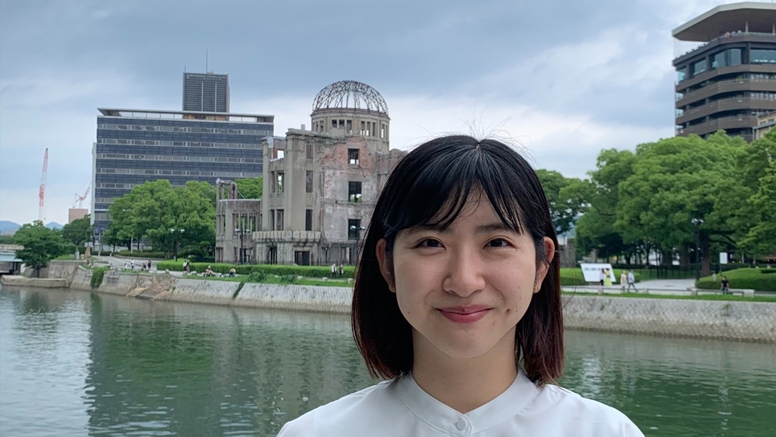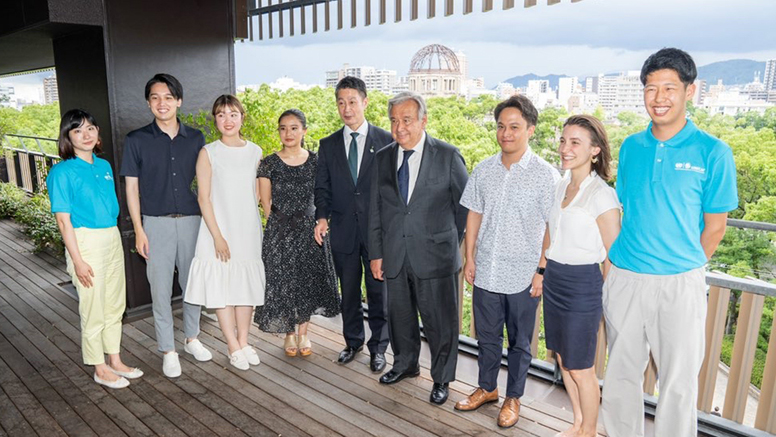Field Work: What TikTok Can Teach Us about War
| by Stephen Diehl
Middlebury Institute student researcher Tricia White has found TikTok a valuable tool for gathering open-source intelligence on the Russia-Ukraine war.

Shizuka Kuramitsu is one of 25 students from around the world selected to participate in an international workshop for young leaders in the nonproliferation field convened by the United Nations’ Office for Disarmament Affairs (UNODA).
Kuramitsu, a student in the Institute’s MA in Nonproliferation and Terrorism Studies (NPTS) program, attended four virtual workshops over the summer and will present her ideas at an October conference at UN Headquarters in New York City. The workshop series, titled “Engaging, Educating and Empowering #Leaders4Tomorrow on Disarmament, Non-Proliferation and Arms Control (D.N.A.) to enact change today,” explores the roles of young people in advancing D.N.A. objectives during five interactive sessions with UNODA staff, youth speakers, and other experts.
“My lifelong goal is to contribute to nuclear disarmament and nonproliferation,” says Kuramitsu, a native of Hiroshima, Japan. “[In these workshops,] I was hoping to deepen my understanding of the nonproliferation and arms control field by gaining new perspectives related to social justice, such as environmental issues, conventional weapons disarmament, emerging technology, and diversity.” She also sought to share with other participants the importance of her hometown and the history that she has inherited from it.
“The UNODA’s selection of Shizuka reflects her potential to be a future leader on issues of disarmament, nonproliferation, and arms control,” says Jeff Knopf, NPTS program chair. “The fact that MIIS students get selected to participate in opportunities like this UNODA workshop series is incredibly valuable. Programs like this enable students to add to their knowledge base, expand their networks, and become known to potential future employers, while also giving them a forum to further develop their own ideas. I’m excited for Shizuka and the benefits she will get from participating in this workshop.”
My lifelong goal is to contribute to nuclear disarmament and nonproliferation.
Kuramitsu says the highlight of her experience so far has been connecting with the “generous and talented” people she has met through the program. “They have taught and showed me that I should find my own approach. I admire the way they follow their passion and I would like to become like them. The diverse environment and unique workshops at this program have helped me visualize how I want to achieve my goals.”
“Shizuka is also committed to doing her own independent research,” notes Knopf. “She was accepted into the NPTS honors thesis program and is writing a master’s thesis examining Japan’s relationship to the Humanitarian Initiative, a diplomatic effort to support nuclear disarmament by drawing attention to the humanitarian consequences of nuclear war.”
Kuramitsu applied for the Leaders4Tomorrow workshop series after one of her classmates recommended the program. “I was not confident enough to apply at first, but she sent me a text to encourage me.” She then presented her draft résumé and statement of purpose to her academic advisor, Elizabeth Bone, who reviewed it and felt she was a very good fit for the program. “I am really thankful for her kind and encouraging words,” Kuramitsu says.
The workshop series will culminate with an October gathering at UN Headquarters in New York City where participants will “present their ideas and recommendations to engage their local communities” on issues of disarmament, nonproliferation, and arms control. The program is sponsored by UNODA and receives financial support from the Republic of Korea’s Ministry of Foreign Affairs.

In parallel with her participation in the Leaders4Tomorrow workshop series, Kuramitsu and classmate Hideo Asano MANPTS ’24 recently traveled to Hiroshima as invited participants for a youth panel discussion with United Nations Secretary-General (UNSG) Antonio Guterres. The event, organized by the Hiroshima Prefecture and UNODA, was hosted in conjunction with the UNSG’s visit to Hiroshima for the annual August 6 memorial ceremony.
Both Kuramitsu and youth panel participant Suzuka Nakamura are alumni of the Critical Issues Forum (CIF), an interactive disarmament and nonproliferation education program for high school students convened by the Institute’s James Martin Center for Nonproliferation Studies. “I am so happy to see the impacts of disarmament and nonproliferation education and so excited for these students,” said CIF Project Manager Masako Toki. Both Kuramitsu and Asano will be attending the ongoing Nonproliferation Treaty Review Conference at UN headquarters in New York.
| by Stephen Diehl
Middlebury Institute student researcher Tricia White has found TikTok a valuable tool for gathering open-source intelligence on the Russia-Ukraine war.
| by Jessie Raymond
CNS launches Machiavelli in the Ivory Tower, a videocast that aims to bring arms control, nonproliferation, and international security issues to a broader audience.
| by Valentina Bianco Hormaechea
Nonproliferation and Terrorism Studies alumna Valentina Bianco Hormaechea describes how an internship with the United Nations led to a permanent professional position.